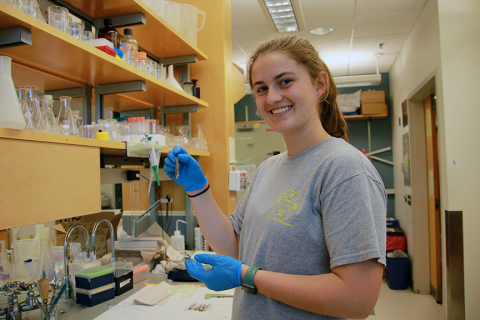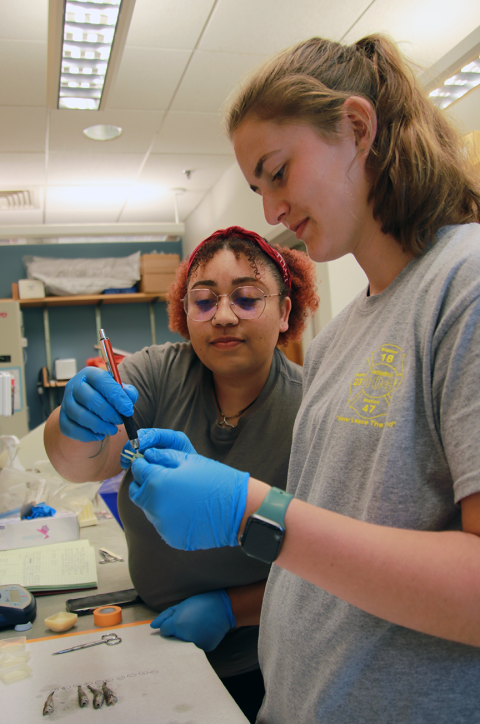
Kennedy McGrath is a dual major in marine, estuarine and freshwater biology and sustainability with a minor in marine policy. Shortly after completing her first year at UNH, she wrote an op-ed about marine plastic pollution for the Concord Monitor. Kennedy conducts her research on marine plastic pollution in the lab of Bonnie Brown, professor of ecological genetics and chair of the department of biological sciences, and she is currently being mentored by Taja Sims-Harper, a doctoral candidate in the marine biology Ph.D. program.
The Kansas City, Missouri native has received the Trustee's Scholarship, the Dickie Family Scholarship and the Anderson Family Scholarship and a Research Experience and Apprenticeship Program (REAP) Fellowship. The topic of her fellowship research is "Body Burden of Microplastics in Two Great Bay Fishes." Her work is also supported in part by the New Hampshire Agricultural Experiment Station through joint funding from the US Department of Agriculture National Institute of Food and Agriculture and the State of New Hampshire.
Last but not least, she has a pet lizard named Buddy.
Kennedy McGrath: I always knew I wanted to study marine biology on the coast somewhere. When I began my college search, UNH immediately stuck out to me because of its great location. As I investigated further, I found out UNH has one of the top-rated marine biology programs in the country, and some of the best faculty, too. When I toured the campus the summer before my junior year, I felt that I could make this place a home.
It was hard to move two thousand miles from everyone I had grown to know leading up to my senior year of high school, but I couldn't be happier with my decision. I have already met so many amazing students and faculty that helped me grow and succeed in ways I never could on my own. I am so grateful to be going into my second year of college surrounded by such amazing people who will help me learn all I can and achieve my professional goals.

Kennedy: I am dual majoring in marine, estuarine and freshwater biology and sustainability. I love how I can take the sustainability piece with me into my marine biology classes and see intersections in every sector. I am particularly interested in how solutions-based research can drive policy change that can protect our oceans from pollution, habitat destruction and human encroachment. Without a holistic understanding of both the scientific and social aspects of sustainability challenges, change could not happen anywhere.
I plan to complete the marine policy minor [through the UNH School of Marine Science and Ocean Engineering], which will further round out my understanding of how large-scale changes can affect each level of government. I want to grow old in a world where our oceans are respected and healthy enough to continue supporting the industries they do today, and this major will equip me with the tools I need to make myself useful on the uphill road to necessary policy and societal changes.
Kennedy: Though I have only been at UNH for a year, I am most proud of the connections I have made with my professors and students from my cohort. Above all, I believe that good relationships are what will push me toward success in college and beyond. I am thrilled that I have been able to surround myself with friends and faculty from club tennis, Student Alumni Association and my classes that challenge and support me as I work toward big academic and personal goals.
Learn more
After my first year I was fortunate enough to earn two scholarships to work with two amazing mentors on research projects that are at the intersection of sustainability and marine biology. I was also accepted for spring of 2023 to the UNH EcoQuest program, which will help me grow as a scientist and a person by giving me a completely different educational experience than what I'm used to. The opinion article I wrote for the Concord Monitor is just the beginning of my future community outreach as I strive to connect the community with global issues in a way that is palatable and inspires change.
Kennedy: After graduation I hope to stay in the New England area and do research that can inform marine policy changes. Since I am still early in my college career, I am trying to get as many different experiences as I can to make choosing a career easier as I inch closer to graduation. I plan to keep taking advantage of as many opportunities as I can to work and study with those that can teach me what they know. I will be happy as long as I am near the coast and my work is impactful and of course, fun.